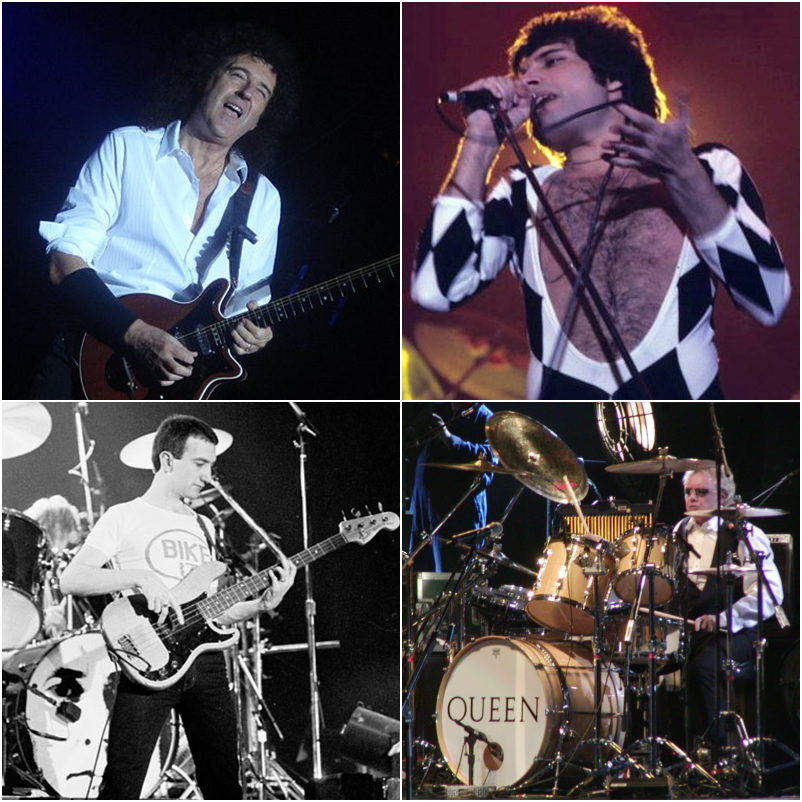‘Bohemian Rhapsody’: Spare me my life from this monstrosity
British rock band Queen. (Top: Brian May, Freddie Mercury, Bottom: John Deacon, Roger Taylor.)
November 4, 2018
Even a “Killer Queen’s” discography couldn’t save “Bohemian Rhapsody’s” attempt to cover Freddie Mercury’s life.
Aptly named after the band’s biggest hit, “Bohemian Rhapsody” follows the journey of world-famous rock band, Queen, from their start as Smile in 1970 to their renowned performance at Live Aid in 1985.
The film takes viewers at a breakneck pace through the life of Farrokh Bulsara in his transformation to the Freddie Mercury the world is familiar with. “Bohemian Rhapsody” takes shortcuts with storytelling, preferring convenience in the script to factual and chronological representation. As a result, the film presents many different aspects of Mercury’s life only to gloss over them.
It’s refreshing that the movie doesn’t shy away from the performer’s sexuality, drug-usage and eventual diagnosis with AIDS, but it feels like none of these are handled with the proper respect or justice they deserve.
Despite script issues, Rami Malek’s portrayal of Freddie Mercury is nothing short of amazing. His performance easily carries the film, Malek nailing down Mercury’s on-stage presence and mannerisms. Casting is fantastic all around, Gwilym Lee as Queen’s guitarist, Brian May, and Mike Myers as the (apparently fictional) EMI executive Ray Foster have standout performances.
Bryan Singer’s direction is the weakest aspect of “Bohemian Rhapsody.” On its own, the script is acceptable. Some moments feel a little too “nudge nudge, wink wink” about the band’s history, with a few too many “Queen will never make it big!” lines, but there’s nothing egregious to it.
Singer’s execution, however, leaves much to be desired. In addition to a lack of style — unforgivable for a movie about the flamboyant Mercury — the movie bounces from scene to scene with little consistency. Scenes go from dramatic to comedic at the drop of a hat, giving me tonal whiplash.
“Bohemian Rhapsody” climaxes with Queen’s performance at Live Aid, the globally-broadcast, multi-artist relief concert for the famine in Ethiopia. While undeserved by the previous events in the movie, the concert is easily the highlight. Everything, down to costuming and stage blocking, is perfect. It’s hard to not enjoy yourself as Malek gallivants across the stage.
As if it even needs to be addressed, “Bohemian Rhapsody” has a stellar soundtrack. Opening with a Queen-themed remix of the 20th Century Fox fanfare, viewers are treated to some of the band’s greatest hits from beginning to end.
There’s a cloud of exploitation and revisionism shadowing nearly every scene in the film. The surviving members of Queen acted as producers and creative consultants on “Bohemian Rhapsody,” controlling the project since its announcement in 2010.
Initially, infamous character comic Sacha Baron Cohen was set to play the starring role as Mercury. Baron Cohen later left the role over creative differences, May citing the actor’s behavior and “untruths” in his portrayal of Mercury for the split.
While there may be truth to the claim, May understandably carries a significant bias and investment in the project. Throughout the film, it feels as if some scenes were sanitized, especially those involving the surviving members of Queen, so as to not affect royalties.
Where “Bohemian Rhapsody” struggled as a film, it absolutely succeeded as a commercial product. Opening weekend it earned a projected $50 million, the second-highest opening for a biopic ever. Queen’s “The Platinum Collection” and the soundtrack for “Bohemian Rhapsody” sit at No. 3 and 5 respectively on Amazon’s best-selling music chart.
And it worked on me. I’ve done nothing but listen to Queen since seeing the movie. Queen is most certainly raking in royalty checks.







